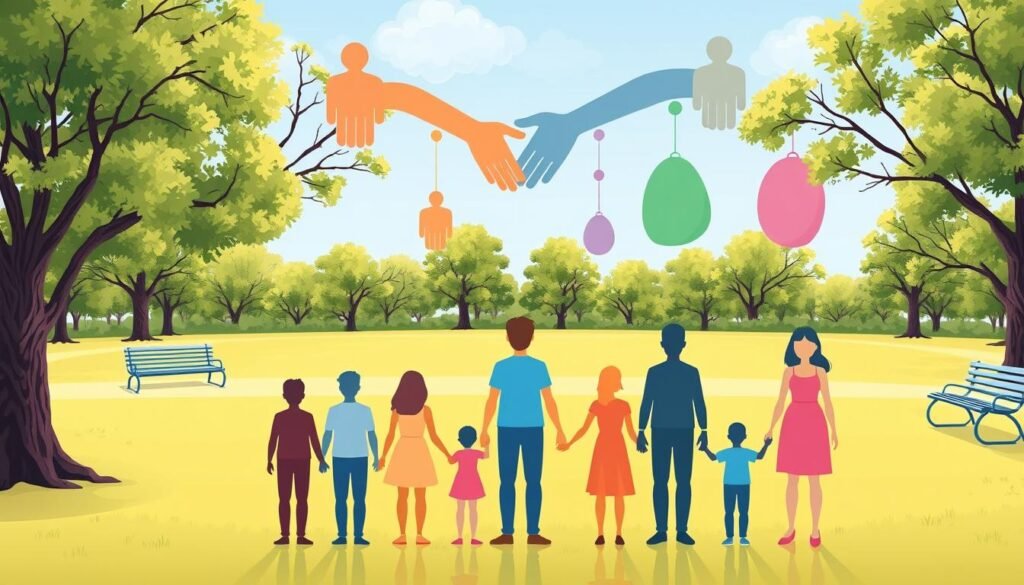Did you know alopecia affects nearly 2% of people? It can cause a lot of emotional pain and make someone feel alone. Having people who care, like family and friends, can change everything for someone with alopecia. Support from loved ones makes them stronger and helps them feel better inside.
Getting involved in the community and forming strong bonds can help too. It’s not just about dealing with alopecia. It’s also about growing as a person. This article talks about the power of having a good support circle when facing alopecia.
Key Takeaways
- Alopecia affects 2% of the population, highlighting the need for strong support.
- Emotional support from family and friends is crucial for resilience.
- Community involvement offers valuable resources and connections.
- Meaningful relationships contribute positively to managing alopecia.
- Building a support network can lead to personal growth and well-being.
The Importance of Emotional Support in Coping with Alopecia
Alopecia can make you feel alone, anxious, and lack self-confidence. It’s key to know how it affects emotions when dealing with it. Emotional support is crucial in finding ways to cope. Having a strong support system boosts resilience when facing alopecia’s many challenges.
Understanding the Emotional Impact of Alopecia
Living with alopecia is hard on your emotions. It can feel like you’ve lost a part of yourself, impacting how you see your value. This often leads to depression and fear of social situations. Support from loved ones is key in easing these burdens. Studies show such support lessens emotional pain, making life better for those with alopecia. Looking into resources like the National Alopecia Areata Foundation helps in creating supportive environments.
How Emotional Support Leads to Resilience
Resilience comes not just from within but also from support around you. When people are there for us, we can better face hard times and manage tough feelings. Support helps us speak about what we’re going through openly. Using mindfulness and talking about our experiences builds community and understanding. This approach greatly lowers loneliness, helping with mental health over time.
Building a Strong Support Network: Key Components
Building a strong support network is all about knowing its crucial parts. It’s important to find trusted folks in your life. This includes family or close friends who are always there for you.
When you find and connect with these people, you feel safe and trusted. This helps boost your emotional health.
Identifying Trusted Individuals in Your Life
It’s key to find people you can rely on for emotional stability. These folks offer a safe place to share your feelings. They are like anchors in tough times, always ready to support you.
Such individuals are known for their empathy and reliability. Knowing you have them by your side can bring emotional comfort. Especially for those dealing with alopecia, it’s comforting to have understanding allies.
Creating a Diverse Network for Multifaceted Support
Creating a diverse network offers wider support. It includes people who can help you in different ways. For example, friends can provide emotional support, while others offer practical help.
This broad network meets various needs, making you more resilient. By connecting with different groups, you build a strong base to face alopecia challenges.

Family’s Role in Providing Support
Family is key in giving support to those with alopecia. Their involvement can boost emotional health and allow open talks to flourish. Offering a safe space for sharing feelings can help ease stress tied to alopecia.
How Family Can Foster Open Communication
Open communication lets family members share thoughts and feelings about alopecia. This dialogue makes individuals feel seen and valued. Strategies to promote this include:
- Listening actively and without judgment.
- Encouraging questions and discussions about feelings.
- Expressing empathy and support consistently.
Open communication not only improves emotional health but also tightens family bonds. Feeling connected helps families support each other better in the alopecia journey.
Encouraging Family Involvement in Treatment Discussions
Including family in treatment talks can better support for alopecia patients. It fosters teamwork and shows the family’s commitment to their health. Family participation in treatment brings many benefits:
| Benefit | Description |
|---|---|
| Improved Outcomes | Studies find that family involvement leads to better treatment results. |
| Emotional Support | Family presence during treatment talks uplifts emotional well-being. |
| Stronger Bonds | Treatment discussions help strengthen family ties. |
Treating alopecia as a team boosts emotional health and creates a strong support network. This is crucial for overcoming alopecia’s challenges.
The Influence of Friends on Well-being
Friends play a key role in our overall well-being, especially for those with alopecia. Strong friendships provide friendship support, forming a solid support system. Keeping these relationships healthy takes work. It’s important to check in often, plan outings, or do group activities to maintain strong bonds.
Strengthening Friendships for a Better Support System
Here are ways to make the influence of friends stronger in your life:
- Schedule regular meetups to talk about life changes and feelings.
- Do group activities like sports, art classes, or book clubs.
- Use social media to keep in touch with friends far away.
- Promote openness and honesty when sharing experiences.
How Friends Can Help Boost Self-Esteem
Supportive friends are key to boosting self-esteem. They provide encouragement and validation in tough times. Here are some things to consider:
- Friends can help each other remember their strengths and successes.
- Sharing experiences can lead to reflection and growth.
- Doing uplifting activities together can reduce stress.
- Celebrating any success boosts a positive mindset.
These strong bonds increase resilience and help maintain a positive life view, especially when facing alopecia.

| Strategies | Benefits |
|---|---|
| Regular Meetups | Deepened connections and emotional support. |
| Group Activities | Better social interaction and stress relief. |
| Open Communication | Enhanced understanding and trust. |
| Celebrating Achievements | Higher self-esteem and motivation. |
Community Involvement: A Broader Support System
Community involvement is crucial for people dealing with alopecia. It offers them a wider support network. Engaging with those in similar situations boosts emotional strength and fosters belonging. Through support groups and social events, people find understanding and shared experiences that help them feel better.
Finding Alopecia Support Groups in the Community
Alopecia support groups are in community centers, hospitals, and online. These groups aim to connect those experiencing hair loss. They share stories, coping tips, and cheer each other on. Joining support groups helps with assistance and friendship. It also prompts people to get involved in their community, helping to nurture a positive emotional state.
The Benefits of Group Activities and Social Events
Group activities and social events help build a support network. These events, like workshops or meet-ups, create connections. Being regularly involved strengthens friendships and the community feeling. It supports emotional well-being and helps people feel they belong. This is key to finding balance and empowerment locally. To see how community involvement benefits lives, visit this resource.

Networking: Expanding Your Support Circle
Having a strong support circle is very important, especially for those dealing with alopecia. Joining online communities and being active in forums can greatly help. Here, people can connect with others facing the same issues. They find understanding, helpful advice, and emotional support.
The Power of Online Communities and Forums
Online spaces are great for making connections and friendships. Forums for alopecia offer places to share stories, ask questions, and get advice. Being part of these online communities helps in understanding alopecia better. It also opens up ways to cope with it.
- Being active in forums can make you feel you belong.
- These connections can become meaningful friendships outside the internet.
- This shared support reduces the loneliness that can come with alopecia.
Networking also gives access to lots of resources and information. Groups like the Alopecia Areata Online Forum and the Reddit Alopecia Community are valuable. People share tips and insights there. This sharing creates a helpful environment. It lets knowledge and personal growth thrive. Networking is key to a strong support network.
Mentorship: Learning from Others’ Experiences
Seeking mentorship can really help those dealing with alopecia. Mentors use their experiences to offer valuable advice during hard times. This special bond allows mentees to discover ways to cope while feeling supported.
How Mentors Can Guide in Times of Need
Mentors share their insights to foster personal growth. They help build support networks for navigating alopecia’s complexities. This can make someone stronger, changing how they face treatment and daily hurdles.
The emotional boost from these bonds can lead to more rewarding experiences.
Finding Mentors in Alopecia Support Networks
Finding the right mentors requires some work, but it’s worth it. Joining alopecia support groups offers a warm setting for finding guidance. Through organizations like the National Alopecia Areata Foundation, many connect with empathetic mentors.
- Attend support group meetings to meet others with similar stories.
- Explore social media groups focused on alopecia to widen your network.
- Contact people who inspire you and have successfully managed their alopecia.
Creating these bonds brings a feeling of unity and opens doors for sharing valuable tips. Mentorship turns living with alopecia into a journey of discovery and growth. For more tips on creating support networks, check out this resource.
Self-Care Practices to Enhance Support Systems
Self-care plays a big role in supporting those around us. When we look after ourselves, we connect better with others. Adding self-care to our daily lives improves our emotional health. This improvement helps us build stronger bonds with friends and family.
Incorporating Self-Care into Your Daily Routine
Having a daily self-care routine boosts emotional strength. Simple activities, like mindfulness, exercise, and hobbies, can make us feel better. They meet our personal needs and help us enjoy our life and relationships more.
- Mindfulness activities like meditation or deep breathing to promote relaxation.
- Daily exercise to boost mood and energy levels.
- Engaging in hobbies to foster creativity and personal satisfaction.
Building Stronger Relationships Through Self-Care
Self-care helps us build stronger connections. When we are happy and balanced, we are more present for our loved ones. This positive mood encourages sharing and strengthens bonds. Focusing on our well-being helps us create a loving support circle.
Self-care boosts our well-being and helps us form better relationships. By committing to self-care, we enjoy closer ties with family and friends.
Conclusion
Having a strong support network is key for those dealing with alopecia. The article has shown how vital emotional support is. It helps individuals be resilient and grow personally. This journey involves everyone – family, friends, mentors, and the community. They all help in facing alopecia’s challenges.
It’s crucial to reach out and build connections for a better support network. A diverse and supportive group of people is important. It gives you different views and strengths. These relationships bring comfort in tough times and let you fully embrace your experiences. For more tips on building a network, check out this resource.
You are not alone in this struggle with alopecia. Making connections, finding resources, and seeking emotional support are important. These steps lead to a brighter view of your journey. Now is the time to start creating a strong support network. It helps everyone grow and ensures no one has to face alopecia alone.